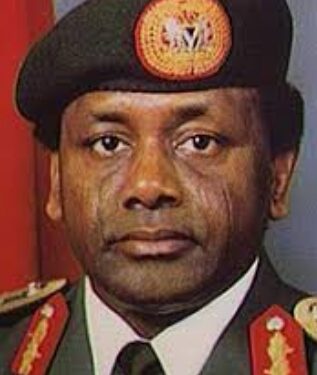Late General Sani Abacha, Nigeria’s 10th Head of State, left an indelible mark on the nation’s sporting landscape during his reign from November 17th, 1993, to his passing on June 8, 1998.
While his leadership was marked by a mix of opinions, there’s no denying that he played a pivotal role in shaping Nigeria’s sporting glory.
General Abacha, the first Nigerian Army Officer to attain the rank of a full military General without skipping a single rank, recognized the power of sports.
He enlisted Chief Jim Nwobodo as the Sports Minister, a man known for his innate passion for sports.
Jim’s track record with Enugu Rangers International in the late ’70s and early ’80s made him a natural choice.
Under Abacha’s directive, Jim Nwobodo was entrusted with replicating the success of Enugu Rangers on a national stage.
General Abacha’s tenure saw Nigeria break a 14-year jinx, winning the African Nations Cup in Tunisia in 1994.
Nigeria demonstrated class and style, announcing its readiness to compete on the world stage.
This success paved the way for Nigeria’s remarkable performance in the 1994 FIFA World Cup in the USA.
At the 1994 World Cup, Nigeria’s Super Eagles, under the guidance of Clemence Westerhof and Johannes Bonfrere, showcased their best football ever.
Players like Rashidi Yekini, Jay Jay Okocha, and Peter Rufai demonstrated Nigeria’s emergence as a global football powerhouse.
Despite being edged out by Italy in the second round, the Super Eagles finished as the 5th best football nation, according to FIFA rankings.
General Abacha’s commitment to sports excellence extended to the Olympics.
Nigeria sent a team of 65 athletes to Atlanta, Georgia, and achieved a historic victory by winning gold in football, a first for any African nation.
This triumph displayed determination and unwavering belief in the face of adversity.
What made General Abacha’s era stand out in sports was the unique combination of motivation, discipline, and unwavering support.
His right-hand man, Major Al Mustapha, played a significant role in motivating the athletes.
He established a strong connection with the players, offering encouragement and personal chats, instilling a sense of belonging.
In contrast, successive governments have struggled to maintain the sporting excellence witnessed during General Abacha’s tenure.
The lack of willpower, discipline, and motivation has hindered Nigeria’s sports development.
Despite having officials with sporting knowledge, the inability to take decisive measures against those undermining sports remains a challenge.
The sports community calls for a change in Nigeria’s sports management.
It is essential to appoint individuals who are passionate, committed, and grounded in the ethos of sports to strategic positions within the sector.
General Abacha’s model of motivation, discipline, and adequate training should serve as a blueprint for the government to rekindle Nigeria’s sporting glory.
As we mourn the retrogression of Nigerian sports, let’s celebrate the man who brought us joy with his sporting acumen – General Sani Abacha.











